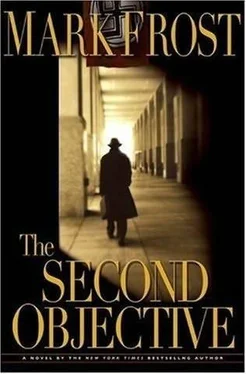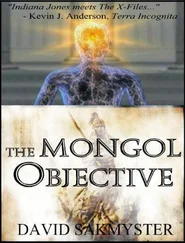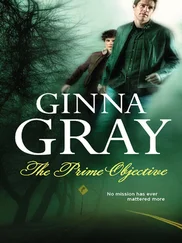At least half a mile short of the station.
“Shit. Shit, shit.”
By the time Grannit worked his way back to the engine car, the train had nearly come to a complete stop.
“That was the signal, wasn’t it?” asked the engineer, looking wide-eyed. “I was supposed to stop, right?”
“Yeah, Ole,” said Grannit. “You were supposed to stop.”
Four men were moving toward them alongside the tracks from the crossroads, flashlight beams zigzagging. Grannit grabbed a lantern and jumped down to meet them.
“Hey, how’s it going there?” said the man leading the way.
The others behind him hung back. Two wore trench coats with raised collars, peaked hats silhouetted black against the sky. Officers.
The advance man stepped into the light of Grannit’s lantern. He was short, energetic, pounding a wad of gum, the flat rasp of Jersey or Philly in his voice. Grannit eyed his insignia; corporal, battalion quartermaster’s staff.
“Eddie Bennings, Company C,” he said, offering a glad hand. “You new to the unit?”
“Just last week. Me and Ole,” said Grannit.
“Welcome to the 724. Let me tell you something, pal: You landed in clover. You been to our billet in Paris yet?” Grannit shook his head. “You’ll see. They don’t call us the ‘million-dollar outfit’ for nothing, know what I’m saying?”
“We heard some talk.”
“So they put you on the milk run up from Matelot, huh?” Bennings waved to the officers, letting them know he had the situation under control. They headed back to the cars.
“Who’s the brass?” asked Grannit.
“Interested parties. We look out for each other in the 724. What the Frogs call ‘es-pree de corpse.’ I’ll explain the drill-what’s your name?”
“Earl Grannit. Like I said, that’s Ole. Ole Carlson.”
“Okay, Earl, there’s a side rail coming up on your right about a hundred yards. We’ll switch you over. Take the whole rig onto that side rail. Uncouple the stock you’re carrying after car eight then head into the station.”
“Just leave ’em?”
“Right. We’ll take it from there.”
“What if the depot asks questions, the end of our run?”
“That ain’t gonna be a problem-”
“We come in three cars light they might-”
“I’m telling you, they won’t have a problem,” said Bennings. “You’re covered, okay? This ain’t our first clambake.”
Earl Grannit toed the dirt for a second, thinking it over. “So what’s our end, Eddie?”
“Listen to you, all business all of a sudden. This ain’t gonna take long. We’ll hook up on the platform after; you’ll make out. Piece a cake. Easy as Betty Crocker.”
“Everything after car eight.”
“You got it, pally,” said Bennings, patting him on the arm and shaking his hand again. He shoved a roll of twenties wrapped around a couple packs of Chesterfields into Grannit’s shirt pocket and handed him a box of cigars. “That’s just a taste. Wait’ll you see the setup in Paris. The 724 takes care of its own, my friend. Our guy Jonesy’ll ride in with you, make sure everything’s square.”
Bennings bounded away down the tracks after the officers. Grannit heard their cars starting up. The fourth man from the crossroad, Jonesy, a hulking, beady-eyed noncom, walked after Grannit toward the engine. Grannit swung back up into the cab ahead of him and stashed the contraband goods in the tender.
“You get all that?” asked Earl quietly.
“The PX cars,” said Ole Carlson.
“You signal the station?”
“They’re at least five minutes away.”
Jonesy climbed up into the cab behind them. Grannit turned to him.
“Ole,” said Grannit. “Jonesy.”
Carlson nodded, friendly, ready to shake hands. Jonesy stuck a toothpick in his mouth, and put a hand on his hip, showing the holstered, pearl-handled.45 on his belt. Making it clear he wasn’t there to chitchat.
“Let’s take her in,” said Grannit.
Ole Carlson engaged the throttle and eased the train forward at five miles an hour. They passed Corporal Bennings, standing by the switch at the crossroads. He gave a jaunty little wave as they rolled past him onto the side rail. Grannit leaned out of the cab and checked the stock behind them, signaling Carlson to brake again once the last car cleared the main track.
“You want to let the station know we’re delayed?” asked Grannit.
Carlson had picked up the transmitter, when two more GIs walked out of the shadows near the engine car, carrying Thompson machine guns. Jonesy grabbed the handset from Carlson and hung it back up.
“Let ’em worry,” said Jonesy. “Let’s get it done.”
Grannit jumped down and headed back along the train. Jonesy followed him a few paces back. A dozen other uniforms stepped out of the woods around them, converging on the end of the train. Two five-ton cargo trucks pulled up alongside the last few cars, men rolling up their canvas backing, ready to load in.
Like vultures, thought Grannit. Like they can smell it.
The first eight cars carried artillery ordnance. They’d been told exactly where the commissary cars started. By the time Grannit reached the coupling, the crew had already pried open the locks and thrown back the sidings. They swarmed inside, foraging through the boxes and crates, looking for cigarettes, liquor, chocolate, soap, coffee. Designated for front-line battalions, this cargo, Grannit knew, would disappear by daybreak into the burgeoning black markets of Paris and Brussels. In the last few months thousands of Allied soldiers had deserted to join this gold-rush racket, siphoning off army supply trains, selling to the French, Belgians, even stranded Krauts with cash. Once the American Army marched into Paris, the situation spiraled out of control. Fortunes were being made. The high-end players were said to be living in style on the Left Bank, like Al Capone and Dutch Schultz. By December over 40 percent of the luxury goods landing at Normandy, the staples of corps morale, never made it to the front-line soldier.
From what Grannit saw in front of him, an entire U.S. railway battalion had been infected, swarming over this train like locusts, their officers standing by to supervise. He’d witnessed enough human imperfection that few variations on the tune surprised him, but this put a fist in his stomach.
Grannit pulled out a heavy coupling jack wedged into the freight car’s slats. As he inserted the jack into the joint to uncouple the cars, the train’s steam whistle blew: three short bursts, then three long, three short.
Ole sending an SOS. If they were paying attention, their backup at the station would double-time it down the tracks.
Grannit looked over at Jonesy. He had turned around, staring back at the engine, trying to decide what that whistle signified, whether he should worry or not.
Grannit covered the five steps between them and tomahawked Jonesy in the back of his knee with the coupling jack. He buckled and dropped to one knee. Grannit caught him with a second shot on the crown of the right shoulder, paralyzing his gun arm before he could reach his holster. Grannit shoved him and Jonesy hit the ground, whimpering in pain, trying to roll off the damaged shoulder. Grannit pulled Jonesy’s Colt and knelt down on top of him, grabbing his neck, driving a knee into the big man’s kidney.
“Stay down, Jonesy,” he said.
“Fuck, what’d you hit me for?”
“You’re under arrest, you dumb shit. Put your hands in front of you and your face in the dirt or I’ll blow your head off.”
Jonesy complied. Grannit slipped a homemade sap out of his pocket-a black dress sock filled with twelve-gauge shot-and cracked him behind the ear. Jonesy went limp. Grannit stood up and turned toward the PX cars. The train whistle hadn’t appeared to alarm the scavengers, and none of them had seen him take Jonesy down in the dark, but more than a few glanced his way. He spotted the two officers he’d seen earlier with Eddie Bennings beside the cargo trucks, looking a lot more concerned.
Читать дальше












